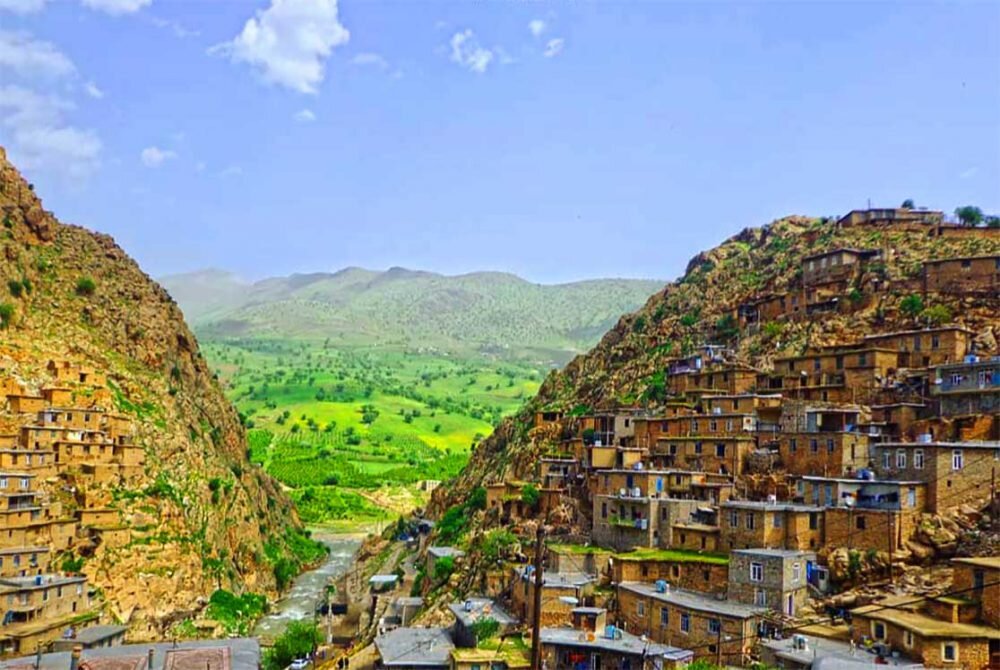Iranian villages vying for UNWTO label

TEHRAN – Iran has nominated eight villages for a special label given by the World Tourism Organization (UNWTO), which recognizes exceptional rural tourism destinations.
Titled “Best Tourism Villages”, the initiative recognizes qualified villages for their commitment to innovation and sustainability in all its aspects —economic, social, and environmental —and a focus on developing tourism in line with the Sustainable Development Goals (SDGs).
“Eight villages situated in various Iranian provinces are competing to be selected as a global village by the World Tourism Organization,” IRNA quoted a tourism official as saying on Wednesday.
The eight nominees have been shortlisted from 130 villages by a working group affiliated with the Ministry of Cultural Heritage, Tourism and Handicrafts, the official said.
The shortlist comprises Kandovan in East Azarbaijan province, Meymand in Kerman, Soheili in Hormozgan, Qasemabad in Gilan, Kandelus in Mazandaran, Palangan in Kordestan, Abyaneh in Isfahan, and the village of Bisheh, which is located in Lorestan province.
The universal initiative aims to highlight those villages where tourism preserves cultural heritage and traditions, celebrates diversity, offers opportunities, and protects biodiversity, the report said.
Home to thousands of ancient villages, Iran perfectly suits the tastes of many domestic and even international vacationers who seek unique nature experiences and untouched landscapes, stay in authentic accommodations, and feel the local lifestyle.
Tourists can take a break from a rural or nomadic family or enjoy an independent stay and help them with daily life. It also opens up the possibility of feeling rustic routines, agriculture, traditions, arts, and culture whose magical know-how is passed from generation to generation.
Boasting many pristine yet diverse natural landscapes, Iran has a lot to offer nature lovers when it comes to rural tourism. Rural tourism, as well as agritourism and farm stays, can be seen as a win-win for both local communities and postmodern travelers looking for unique experiences.
Above all, rural tourism creates the basis for the economic development of rural areas by creating additional income and jobs. It can also improve social well-being in rural areas, for example, by encouraging improvements in infrastructure, sanitation, and electricity grids.
Since its introduction in 2021, over 70 villages from almost 40 countries have been recognized as Best Tourism Villages. The selection is based on an evaluation of initiatives in nine areas covering sustainable development.
According to the UN tourism body, villages, which do not fully meet the criteria can benefit from the ‘Best Tourism Villages by UNWTO’ Upgrade Program, which offers support to those villages to address the gaps identified in the evaluation process.
Moreover, the initiative also includes the ‘Best Tourism Villages by UNWTO’ Network, which offers a platform for exchanging experiences and good practices.
This initiative is expected to put Iran's rural destinations on the world map and earn them well-deserved recognition from the UNWTO.
The World Tourism Organization considers rural tourism to be a type of activity where the visitor's experience is related to a wide range of products, generally associated with activities in nature, agriculture, rural lifestyle, culture, fishing, and sightseeing. This tourism is also characterized by a low population density, a landscape characterized by agriculture and forestry, and a traditional social structure and way of life.
The UNWTO Best Tourism Villages award recognizes outstanding examples of rural tourism destinations with cultural and natural treasures that preserve and promote rural and community-based values, products, and lifestyles and has a clear commitment to innovation and sustainability in all its aspects. The selection is based on an assessment of their resources and initiatives in nine areas covering the three pillars of sustainable development (economic, social, and environmental).
Moreover, the ‘Best Tourism Villages by UNWTO’ Upgrade Program benefits a number of villages among those that do not fully meet the criteria to obtain the recognition. These villages receive support from UNWTO and partners to address the gaps identified in the evaluation process.
In addition, the ‘Best Tourism Villages by UNWTO’ Network provides a space for exchanging experiences and good practices and opportunities. It includes representatives of the villages recognized as ‘Best Tourism Village by UNWTO’ as well as the villages participating in the Upgrade Program and it will benefit from the contributions of experts, public and private sector partners engaged in the promotion of tourism for rural development. The Network also contributes to the work of UNWTO in identifying good practices, developing guidelines and policy recommendations, as well as insights and knowledge.
The applications are evaluated by an independent International Advisory Board consisting of experts in different fields (cultural and natural resources preservation, sustainability, tourism product development, marketing, value chain, etc.) based on nine areas, including sustainability, infrastructure, connectivity, and tourism value chain integration.
AFM
